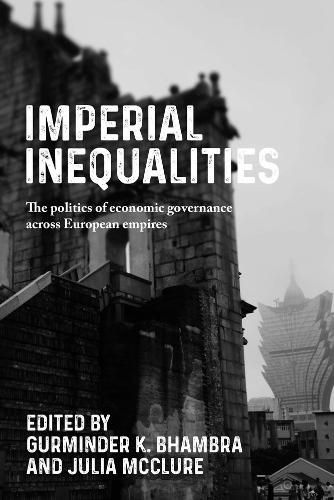Readings Newsletter
Become a Readings Member to make your shopping experience even easier.
Sign in or sign up for free!
You’re not far away from qualifying for FREE standard shipping within Australia
You’ve qualified for FREE standard shipping within Australia
The cart is loading…






Imperial Inequalities takes Western European empires and their legacies as the explicit starting point for discussion of issues of taxation and welfare.
In doing so, it addresses the institutional and fiscal processes involved in modes of extraction, taxation, and the hierarchies of welfare distribution across Europe's global empires. The idea of 'imperial inequalities' provides a conceptual frame for thinking about the long-standing colonial histories that are responsible, at least in part, for the shape of present inequalities.
This wide-ranging volume challenges existing historiographical accounts that present states and empires as separate categories. Instead, it views them as co-constitutive units by focusing upon the politics of economic governance across imperial spaces.
Authors examine the fiscal innovations that enabled European empires to finance their expansion, the politics of redistribution that were important to constructing the veneer of legitimacy of taxation, and the fiscal mechanisms that were established to ensure that the imperial contours of inequality continued to define the postcolonial world. These diverse contributions provide new resources for how we think about issues of taxation and welfare across the longue duree.
This book is relevant to United Nations Sustainable Development Goal 10, Reduced inequalities.
$9.00 standard shipping within Australia
FREE standard shipping within Australia for orders over $100.00
Express & International shipping calculated at checkout
Imperial Inequalities takes Western European empires and their legacies as the explicit starting point for discussion of issues of taxation and welfare.
In doing so, it addresses the institutional and fiscal processes involved in modes of extraction, taxation, and the hierarchies of welfare distribution across Europe's global empires. The idea of 'imperial inequalities' provides a conceptual frame for thinking about the long-standing colonial histories that are responsible, at least in part, for the shape of present inequalities.
This wide-ranging volume challenges existing historiographical accounts that present states and empires as separate categories. Instead, it views them as co-constitutive units by focusing upon the politics of economic governance across imperial spaces.
Authors examine the fiscal innovations that enabled European empires to finance their expansion, the politics of redistribution that were important to constructing the veneer of legitimacy of taxation, and the fiscal mechanisms that were established to ensure that the imperial contours of inequality continued to define the postcolonial world. These diverse contributions provide new resources for how we think about issues of taxation and welfare across the longue duree.
This book is relevant to United Nations Sustainable Development Goal 10, Reduced inequalities.